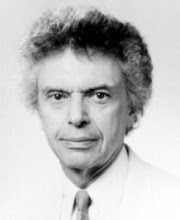Reflections About Classical Adlerian Depth Psychotherapy: Theory, Practice, and Life
A vigorously optimistic and inspiring approach to prevention and treatment, Classical Adlerian Depth Psychotherapy balances the equally important needs for individual, optimal development and social contribution. With a solid foundation in the original teachings and therapeutic style of Alfred Adler, it integrates the self-actualization research of Abraham Maslow. For more information, visit our web site at http//www.Adlerian.us
About Me

- Name: Henry T. Stein, Ph.D.
- Location: Bellingham, Washington, United States
Classical Adlerian psychotherapist and training analyst. Director of the Alfred Adler Institute of Northwestern Washington, offering distance training in Classical Adlerian psychotherapy. Tel: (360) 647-5670. Email: htstein@att.net
Saturday, April 28, 2007
Friday, April 27, 2007
Freedom, Imagination, and Creativity
In his article (April 27, 2007, New York Times), "China Needs an Einstein. So Do We," Thomas Friedman raises the questions about the relationship of freedom and creativity. Referring to Walter Isaacson's new biography of Albert Einstein, Einstein: His Life and Universe, Friedman speculates on Einstein's comment about the importance of imagination over knowledge. Einstein also thought that the freest society with the most rebellious thinking would be the most creative. Certainly, a shift in educational focus would probably contribute to fostering creativity and innovation in future scientists and mathematicians. However, another important, personal factor needs to be considered. As Alfred Adler pointed out, the psychological restriction of a style of life also inhibits creativity. Dissolving that style of life through depth psychotherapy can re-awaken and stimulate the creative power of an individual. Abraham Maslow affirmed this perspective in his writings about creativity. An entire culture may be oppressed by a totalitarian government, but an individual may also be trapped within the confines of an imperious style of life and fictional final goal.
Wednesday, April 25, 2007
Killers and Narcissism
In "Its All About Him" (April 10, 2007 issue of Time Magazine), David von Drehle addresses the issue of narcissism in killers. He challenges other theories that emphasize the influences of culture, guns, musical lyrics, or films, and highlights the common denominator in most killers: extreme self-centeredness. He elaborates by listing the other common traits of narcissists: grandiosity, numbness to the needs and pain of others, emotional isolation, resentment, and envy. Although Drehle does not mention Adler, the implications of a profound absence of social interest are evident in the article. As Adler pointed out, the roots of this problem can be identified in early childhood by teachers who are well-trained in Individual Psychology. Rather than spending a fortune on building bigger prisons, we could invest in prevention at the level of early childhood education. Alfred Adler, Oscar Spiel, and Frederick Birnbaum showed what could be achieved in the Vienna schools in the 1920's and 1930's.
Tuesday, April 24, 2007
Thursday, April 19, 2007
Human Rights and Equality
Two recent reviews ("Natural, Equal, Universal" by Gordon Wood, N.Y. Times Book Review, 4/8/07, and "Sentimental Education: The Invention of Human Rights," by Joanna Burke, Harpers Magazine, May 2007) of "Inventing Human Rights: A History," by Lynn Hunt, trace the evolution of human rights, from its proclamations in America in 1776 and France in 1789, to the twentieth-century term "empathy." The author's thesis that human rights require three interlocking qualities: rights must be natural (inherent in human beings), equal (the same for everyone), and universal (applicable everywhere) echoes Adler's vision of the evolution social equality and Gemeinschaftsgefeuhl.







